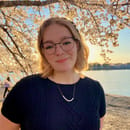WASHINGTON, D.C.– Bill Gates, world-renowned businessman, software developer, and philanthropist, spoke to four D.C. universities on Wednesday afternoon to discuss his new book How to Avoid a Climate Disaster. He discussed how he became involved in climate change innovations and his ideas to combat climate change.
Gates explained that was first exposed to climate change in 2000 while in Africa and saw the effects firsthand. He started to learn from professors and began investing in climate change innovation around 2010.
A student asked Gates, “What are you doing to address climate change?” Gates acknowledged that he bears a lot of responsibility due to the amount of travel he does in a normal year, but explained that he is now the world’s largest individual consumer of biofuel and green aviation fuel. He has also helped fund housing projects to improve heating and cooling systems, and funds major carbon capture projects. Gates later admitted, “I’m trying to do my part because I’ve seen the damage that’s already taking place.”
Students and the moderator, CBS This Morning’s Michelle Miller, were curious about carbon capture, an expensive technology that pulls carbon from the atmosphere and stores it underground. Gates explained that other offsets, like planting trees, are less effective and do not last as long. However, Gates admitted that carbon capture technology is not widely used because “gold-standard offsets are quite expensive.”
Gates described investment in research and development as the “supply-side” of climate change solutions and consumer choices as the “demand side,” and explained that we need a balance between the two that meets emissions reduction goals. Consumers can express their concern for climate change with their wallets by choosing to buy environmentally friendly products, electric vehicles, synthetic meat, and other products. Raising the demand for these products, Gates argued, will encourage people to invest in research and development to develop climate change innovations. Gates, an innovator himself, pushed for innovation throughout the talk because he believes that current technologies can not adequately address the impending climate disaster.
A student at Howard University asked Gates to discuss his thoughts on environmental justice. Gates admitted that he was new to the subject, but was learning from top experts including Dr. Cecilia Martinez, the Senior Director for Environmental Justice at the White House Council on Environmental Quality. With that said, Gates believes that there needs to be greater dialogue between the climate change and environmental justice movements. He also discussed the need to expand the environmental justice movement to a global scale and pointed to Africa as the most vulnerable region.
Finally, Gates concluded by reflecting on the United States’ role in the international arena. Connecting back to his support for research and development, Gates claimed that the U.S. could and should be a leader in climate change solutions because “the U.S. has the majority of the innovation capacity in the world…it’s not just the research jobs– it’s also the factories, the exports.” He went on to say that “our scientific strength almost guarantees that if we anticipate this shift in demands, we’re the ones that can meet these opportunities.” On this note, he expressed his support for nuclear energy and offered some innovative proposals to make nuclear energy safer, including digital simulations and fourth generation digital design.
Gates attributed his success in the field to learning from others. “I’m a student,” Gates said succinctly. He encouraged all the students in attendance to learn from those around them and those who were vocal about climate change because. “The more you learn, the more the pieces fit together.”
Photos: Her Campus Media



